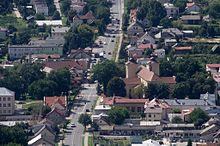Końskowola
| Końskowola | ||
|---|---|---|

|
|
|
| Basic data | ||
| State : | Poland | |
| Voivodeship : | Lublin | |
| Powiat : | Puławski | |
| Gmina : | Końskowola | |
| Area : | 9.81 km² | |
| Geographic location : | 51 ° 25 ' N , 22 ° 3' E | |
| Height : | 162 m npm | |
| Residents : | 2188 (2004) | |
| Postal code : | 24-130 | |
| Telephone code : | (+48) 81 | |
| License plate : | LPU | |
Końskowola is a village in southeast Poland in the Powiat Puławski of the Lublin Voivodeship . It is the seat of the rural community of the same name and is located on the Kurówka River .
history
From June 8, 1532 to 1870, it had city status. The village was named after its founder Jan Koninski and was first mentioned in 1442.
In the course of the third division of Poland , the place came under Austrian rule in 1795. In 1809 he became part of the Duchy of Warsaw . It became a center of the grocery trade and had several textile factories. People from all over Poland and also from Saxony settled here and in 1841 founded a Protestant branch church from Lublin. After the January Uprising Końskowola lost the 1870 city law . It has belonged to Poland again since 1918.
At the beginning of the Second World War , on September 15, 1939, Końskowola was occupied by Germany. A prisoner of war camp was set up, but it only lasted for a short time. The concentration camp established here existed until 1943.
The local Jews, but also Jews from Slovakia , were settled in the local ghetto . On May 8, 1942, many Jews were deported to the Sobibor extermination camp . In October 1942, the ghetto was created by the III. Battalion of the 25th Police Regiment, of the former Reserve Police Battalion 101, liquidated and around 1000 people killed.
local community
The rural community (gmina wiejska) Końskowola has almost 9000 inhabitants.
tourism
The most famous sight of Końskowola is the Catholic Church with the family crypt of the Opalinskis and Lubomirskis and tombstones designed by Tylman van Gameren . Another church in the village was built in 1613 in the style of the Lublin Renaissance. There is also an evangelical cemetery.
The Polish poets Franciszek Dionizy Kniaźnin and Franciszek Zabłocki died in Końskowola .
Web links
- Końskowola . In: Filip Sulimierski, Władysław Walewski (eds.): Słownik geograficzny Królestwa Polskiego i innych krajów słowiańskich . tape 4 : Kęs – Kutno . Walewskiego, Warsaw 1883, p. 357 (Polish, edu.pl ).
- Końsko wola . In: Filip Sulimierski, Władysław Walewski (eds.): Słownik geograficzny Królestwa Polskiego i innych krajów słowiańskich . tape 15 , part 2: Januszpol – Wola Justowska . Walewskiego, Warsaw 1902, p. 117 (Polish, edu.pl ).
- History of Końskowola
- Końskowola during the war

